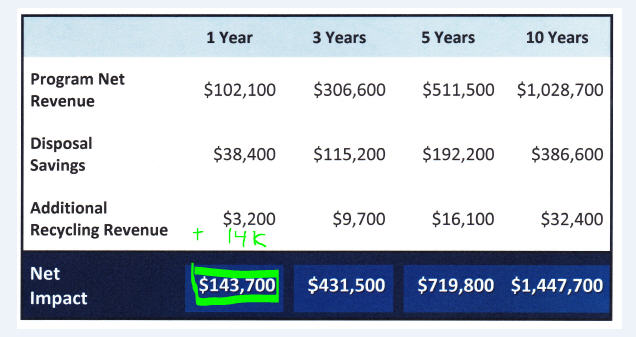On 11/25 we further worked on wording for the Petitioned Warrant Article for SMART (Save Money and Reduce Trash) – we are still fine tuning the wording and plan to begin collecting signatures by next weekend.
The warrant article will include a higher predicted “Net Impact” (or savings) of $150K per year (instead of $143K) as WasteZero’s #s (below) had assumed only $15/ton received for recycling (appropriate for single stream) while Rye receives more than $120/ton on average for separated recycling streams. (used $80/ton which increased the Additional revenue for 215 tons recycling to $17,200)
Projected SMART Benefits and Savings:

With SMART – trash would no longer be “out of sight out of mind” but metered by quantity somewhat like other utilities where we pay for what we use.
“… essentially meters solid waste disposal like electricity, gas, and water; incentivizing reuse, recycling, and composting.” – Josh Denton, Portsmouth Blue Ribbon Committee on Sustainable Practices
Another benefit of SMART is that it would alleviate the need to validate that users of the Rye Transfer Station are in fact residents of Rye (or seasonal renters of Rye properties).
From the EPA re: Trash-metering:
1. Environmental Sustainability – Communities with programs in place have reported significant increases in recycling and reductions in waste, due primarily to the waste reduction incentive created by PAYT. Less waste and more recycling mean that fewer natural resources need to be extracted. In addition, greenhouse gas emissions associated with the manufacture, distribution, use, and subsequent disposal of products are reduced as a result of the increased recycling and waste reduction PAYT encourages. In this way, PAYT helps slow the buildup of greenhouse gases in the Earth’s atmosphere which leads to global climate change. For more information on the link between solid waste and global climate change, go to EPA’s Climate Change Web site.
2. Economic Sustainability – PAYT is an effective tool for communities struggling to cope with soaring municipal solid waste management expenses. Well-designed programs generate the revenues communities need to cover their solid waste costs, including the costs of such complementary programs as recycling and composting. Residents benefit, too, because they have the opportunity to take control of their trash bills.
3. Equity – One of the most important advantages of a variable-rate program may be its inherent fairness. When the cost of managing trash is hidden in taxes or charged at a flat rate, residents who recycle and prevent waste subsidize their neighbors’ wastefulness. Under PAYT, residents pay only for what they throw away.